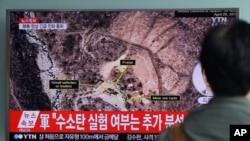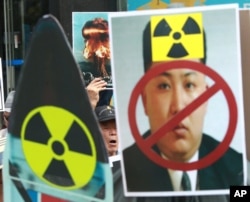The U.S. and its allies have responded to North Korea’s fifth nuclear test conducted on Friday with calls for new sanctions, but China continues to give off ambiguous signals about whether it will support any further punitive action against its traditional ally.
In response to reports that Pyongyang may already be planning another nuclear test, South Korea’s Defense Ministry on Monday said the North has the capability and an unused tunnel at its mountainous test site to do so.
“With regards to possibility of North Korea's additional nuclear test, South Korea and the U.S. intelligence assess that it is always ready to conduct an additional nuclear test,” said South Korean Defense Ministry spokesman Moon Sang-gyun.
The U.S. military will bring in a B-1B bomber from Guam to South Korea in a show of force, but that deployment has been delayed due to bad weather conditions.
Sanctions
South Korean President Park Geun-hye held an emergency meeting on Monday with leaders from both her ruling Saenuri Party and the two main opposition parties, the Minjoo Party and the People’s Party to urge for unity in response to the growing North Korean nuclear threat.
South Korea is coordinating with the U.S., Japan and other countries to press for increased sanctions against North Korea at the United Nations Security Council.
These new measures could add to the list of banned export items, and expand the number of blacklisted North Korean individuals and entities connected to the North’s military and weapons programs.
Sung Kim, the U.S. special envoy on North Korea policy said Washington and its allies in the region are also considering additional unilateral sanctions to impose as well.
However North Korea, through its state media KCNA news agency on Sunday, called the U.S. led push for new sanctions “meaningless” and “highly laughable.”
In defiance of the last round of international sanctions imposed in March, North Korea has accelerated its weapons development efforts, conducting two nuclear tests this year as well 21 missiles tests, including a long range rocket in February and advancing its submarine based missile launch capability.
China
While these restrictive measures imposed on North Korea have caused some economic pain in trade, shipping and finance, the impact has reportedly been mitigated through black market dealings, integration with foreign companies, and a lax approach to enforcement by China.
Beijing’s cooperation on sanctions is considered crucial because 90 percent of North Korean trade flows either to or through China.
The U.S. has called upon China to exert more pressure on the North to give up its nuclear program in return for economic aid and security assurances.
While Beijing has called on Pyongyang not to take any more provocative actions, Northeast Asia analyst Daniel Pinkston with Troy University in Seoul said even now the Chinese remain reluctant to impose measures that could trigger regional instability or the collapse of the Kim Jong Un government.
“I think they will keep the lifeline in place for North Korea,” said Pinkston.
China's Foreign Ministry said on Monday that sanctions alone cannot solve the North Korean nuclear issue and that unilateral action can only lead to a dead end
Military option
But Beijing is also growing more upset with Pyongyang.
North Korean Foreign Minister Ri Yong Ho, formerly the country's chief nuclear negotiator, arrived in Beijing on Monday and was seen entering the country's embassy, Japan's Kyodo news agency reported.
Professor Woo Su-keun, of Donghua University in Shanghai, says China is becoming increasingly concerned that North Korea’s unchecked nuclear and missiles tests could at some point provoke a military response.
“China knows well that the U.S. conducted independent military actions against Afghanistan and Iraq, as it judged they could be threats to its national security in the past,” said Professor Woo.
North Korea had earlier this year threatened preemptive nuclear strikes against the U.S. for conducting joint military drills with South Korea.
U.S. President Barack Obama has said he will never accept North Korea as a nuclear state.
Hillary Clinton, the Democratic Party candidate for president, said over the weekend she would seek to impose tougher sanctions, but also left open the possibility for restarting international talks with North Korea, if she is elected.
Donald Trump, the Republican candidate for president did not say what he would do to restrain North Korea, but his campaign manager Kellyanne Conway said, if Trump is elected North Korea will know that the Americans "aren't messing around."
Trump has also indicated that he might support allowing South Korea and Japan to develop nuclear weapons of their own to defend against a nuclear North Korea.
Youmi Kim in Seoul contributed to this report.







